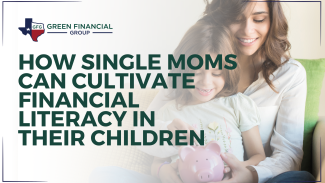
How Single Moms Can Cultivate Financial Literacy In Their Children
Being a single mom is a journey filled with unique challenges, one of which is learning how to equip your children with the tools they need to navigate their financial futures. As a financial advisor focused on empowering women, many of whom are single moms, I understand the hurdles that may come with this responsibility. In this blog post, we'll delve into a few actionable steps that can help single moms foster financial literacy in their children.
Balancing numerous responsibilities is a hallmark of single parenthood. Amidst these demands, the task of instilling financial literacy in children can sometimes feel overwhelming, even if its importance is recognized. For those of you who need some extra support in this area, here are a few pieces of encouragement for you as you start on your family financial education journey:
Acknowledge Your Strengths
First, I hope you will recognize and celebrate all of the financial decisions you have navigated independently. By acknowledging your own personal financial achievements, your confidence in this area will be boosted and can help set a powerful example for children.
Seek Support and Education
You do not have to take on financial literacy and education all by yourself. Leverage resources available for parents, especially single parents. Seek support groups, financial literacy workshops or connect with a financial advisor who understands the challenges faced. Expanding your own knowledge base will enhance how you’re able to guide your children.
Embrace Open Communication
Create an environment where financial discussions are open and judgment-free. Encourage children to ask questions, share concerns, and express curiosity about money matters. This open dialogue fosters security and makes financial topics less daunting.
Now let’s get into the nitty gritty. Here are a few action items and specific ideas for how you can start money conversations within your household for your children of various ages:
For Very Young Children:
- Introduce Money Concepts through Play
Engage in activities like playing store, using play money and assigning values to items. This makes learning about money fun and accessible – and creates a fun way for you to connect with your kids while they are learning.
- Make Storytime About Money Lessons
Incorporate children's books that teach financial lessons. Look for stories that explore concepts like saving, sharing and spending wisely. Here’s a great list of picture books that talk about money that I found via Brightly.
For Young Children & Middle Schoolers:
- Provide An Allowance for Chores
Assigning allowance for completing chores not only teaches kids the correlation between effort and earning, but also instills a sense of accountability and pride in their contributions to the household.
- Involve Your Kids In Comparison Shopping
Through comparison shopping, children learn to discern between needs and wants, develop critical thinking skills by evaluating product features and prices, and become more savvy consumers. For example, when you’re at the grocery store or the toy store, talk to them about prices and weighing pros and cons of different items.
- Help Them Establish Saving Goals
Encourage your kids to set financial goals for bigger ticket things they want such as a new bike, tickets to a concert or a new purse. Establishing saving goals encourages children to prioritize their spending, cultivate patience and delayed gratification and fosters a sense of accomplishment and financial responsibility.
For High School-Aged Children:
- Encourage Part-Time Work
Support part-time jobs or internships during high school. Earning their own money provides invaluable lessons in budgeting, saving and understanding the value of hard work. It will also look great on their college resume and give them invaluable real-world experience.
- Introduce Them to Banking
Help them set up a bank account and teach them about concepts like interest, checking and savings. Involve them in managing their own accounts. You would be shocked by how many high school and college students I come across who have no idea how to write a check!
For Adult Children:
- Focus On The Importance of Budgeting
Guide them in creating a budget that aligns with their goals. Help them find an Excel template for budgeting or find an app on their phone together that can help. Make sure to discuss topics like managing debt, emergency funds and long-term financial planning.
- Emphasize Responsible Credit Card Use
Stress the importance of responsible credit card usage by stressing the significance of paying off balances in full each month to avoid accruing high-interest debt. Additionally, educate them on how credit scores are influenced by factors like on-time payments, credit utilization and length of credit history, empowering them to make informed decisions and maintain healthy financial habits.
- Share Investing Insights
Introduce the basics of investing and the power of compounding. Consider investing together or discussing investment strategies. Talk to a financial planner who can help integrate your children into your own financial strategies so they feel empowered and encouraged to learn more.
Why It's Important: Empowering children with financial literacy is a gift that lasts a lifetime. It equips them with the skills to make informed decisions, weather financial challenges, and build a secure future. For single parents, it's a profound way to contribute to children's resilience and success, reinforcing that they are capable of financial independence.
As a CERTIFIED FINANCIAL PLANNER® professional and Financial Advisor, I’ve witnessed first-hand the transformative impact that financial literacy can have on children's lives. By bolstering your own confidence, seeking support and implementing age-appropriate action items, a bright financial future for your children can be actively and collaboratively shaped.

